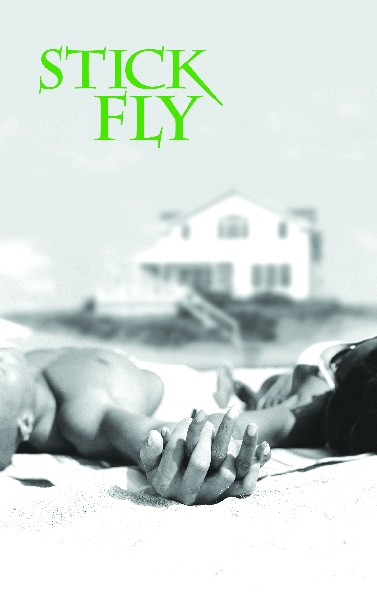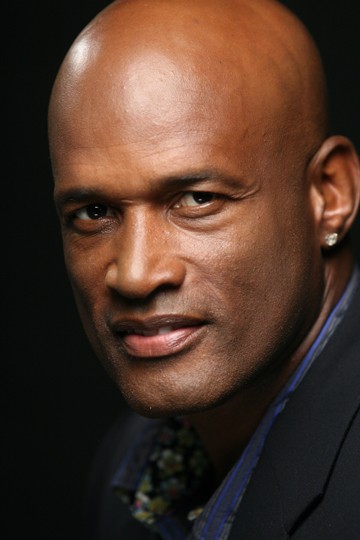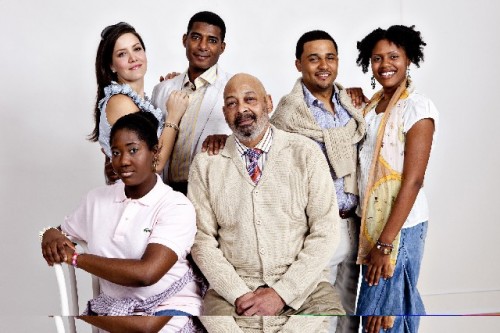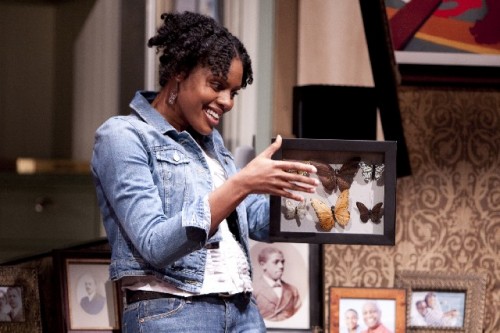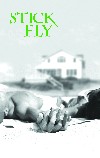Stick Fly Brilliant At Calderwood Pavilion
Class, Race and Humor Dramatically Rendered
By: Mark Favermann - Feb 24, 2010
Produced by the Huntington Theatre Company
527 Tremont Stree, Boston, MA
Each of the actors does a sensitive portrayal of their individual and often a bit quirky character. Each character represents a distinctive individual and though not stereotypical, a particular type. The complexity of the characterizations is a major strength of the play. We are first introduced to Cheryl (Amber Iman) who is cleaning the house while dancing to her music. This says a lot about her. The youngest of the characters, she acts as the Greek Chorus and conscience to the others. She is substituting for her mother, the longtime LeVay maid and cook, a domestic foundation of the LeVays. A traditional Black church lady, she is sort of a working class downstairs to the upper class family's upstairs. However, Cheryl was sent to a prestigious prep school. Her mother's absence is telling.
Kent (Jason Dirden) is the youngest LeVay son. He is the prodigal child, the one who cannot seem to get his act together in this high achieving household. He is the bane of his father's preferred existence, and yet the favorite of his well-born mother. After trying law school and a graduate program in sociology, in his current incarnation, he is a novelist. His father still puts him down, but his fiance Taylor (Nikkole Salter) appears to really love him.
However, she has her own issues: lower middle class, rejected by her prominent, World -enown Pulitzer Prize-winning social anthropologist father. A father similar in achievement to the LeVays, but a father who abandoned her and her mother for another family. One of her contradictions is her education, a PhD with a degree from Harvard. She is in a post-doc at Johns Hopkins. There are secrets all over the place among and around all of the characters. The older brother Flip (Billy Eugene Jones) is the father's favorite. Literally a chip off the old block, like his dad, he is a surgeon, plastic surgeon rather than for the brain. Flip is a ladies man, a player, again a chip off the old block. Kimber (Rosie Benton), Flip's Caucasian girlfriend adds racial tension to the mix and brings a certain softening of the edges to the narrative.
The most complex and therefore difficult character is Joe LeVay (Wendell W. Wright), the LeVay patriarch. He is haughty, imperious and arrogant, quite doctor-like, but with personal quirks. His worldview is distorted, but formed by his experiences. His wife's family, the Whitmores, actually owned the island mansion. An ancestor was a Black ship's captain whose cargo was not mentionable, but whose reward was the prominent land parcel that the house was built on. Dr. Joe LeVay's money paid for the houses renovation, but the house was always Mrs. LeVay's. Ownership, prestige, money, race, class and sexuality are all part of the narrative stew.
Martha's Vineyard first African-Americans were a small community that was made up of primarily slaves and indentured servants. The community increased on the island in the late 18th and early 19th centuries as freed and fugitive slaves sought refuge there. These pioneering individuals often worked in the fishing and whaling industries.
In the mid-19th century, both black and white visitors flocked to the island for the Methodist and Baptist revival camp meetings. Their tents were replaced with permanent houses, and the surrounding area developed into a resort community. African-Americans began to build their own neighborhood in the town of Oak Bluffs.
Following World War II with its economic prosperity, African-Americans began to come to Oak Bluffs to buy and rent summer homes. By 1947, Ebony Magazine reported that "the most exclusive Negro summer colony in the US was at historical Oak Bluffs, a quaint 19th Century village on Martha's Vineyard." This tradition continues today.
Stick Fly's LeVay vacation house is in Edgartown not Oak Bluffs. Property has become more exclusive as demand has increased. Well-educated vacationers who are often leaders in their fields are able to relax on the island in the company of their peers, friends and family, not having to deal with the pressure of representing their race in their workday predominantly white professional circles.
In setting Stick Fly on Martha's Vineyard, playwright Diamond strategically places the LeVay family in a community of their peers, a luxurious place where the family's disfunctionality is clearly expressed in spite of their wealth. This focused environment calls into question perceptions of race, class and even gender both by the characters and by the audience.

